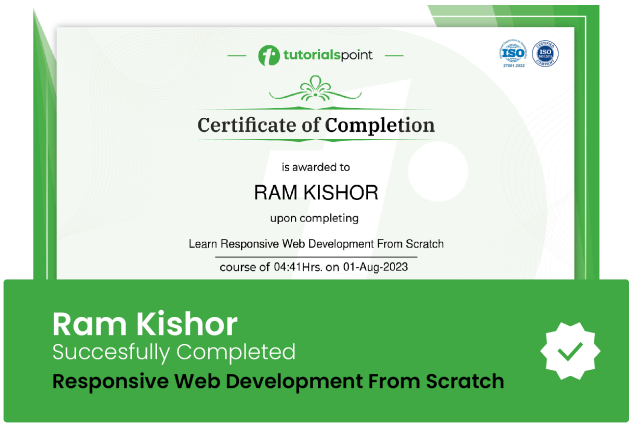Introduction to electrical circuit theory
Analysis and Simulation of DC Circuits

Lectures -18
Duration -2 hours

30-days Money-Back Guarantee
Get your team access to 10000+ top Tutorials Point courses anytime, anywhere.
Course Description
The Introduction to Electric Circuit Theory course is a friendly introduction to circuit theory and analysis. In this course, you will learn some techniques for determining the behavior of simple electrical circuits. These techniques include:
Kirchhoff’s Laws (current and voltage law)
Mesh Analysis
Superposition Theorem
Thevenin’s Theorem
Circuit Simulation with Proteus
You will be introduced to circuit concepts and terminology such as:
Node
Loop
Mesh
Open Circuit
Short Circuit
You will analyze circuits that consist of voltage sources and resistors. This course is designed such that the theory behind the listed circuit analysis techniques is treated first, then numerical problems using these techniques is covered. In order for students to have a full understanding of the math behind circuits, they need to solve a variety of problems. This course does justice to that department by providing several practice problems (assignments) with solutions in order for students to evaluate their understanding.
Regardless of the aspect of electrical engineering a student might want to specialize in, it is important to have a good knowledge of circuits, their behavior, and how to analyze them. The simplest way to introduce beginners to electrical circuits is to treat the analysis of circuits with simple components.
After completing this course, I can guarantee that students will be able to apply different circuit analysis techniques and theorems to analyze electrical circuits. They will also be able to simulate these circuits using Proteus. These skills will prepare them for more advanced courses requiring the application of circuit theory such as:
Electronics
Control Systems
Electrical Machines
Power Systems etc.
Goals
What will you learn in this course:
- Analysis of DC circuits with voltage sources
- Kirchhoff's Laws
- Mesh Analysis
- Superposition Theorem
- Thevenin's Theorem
- Circuit simulation with Proteus
Prerequisites
What are the prerequisites for this course?
- Understanding of Ohm's Law
- Resistances in Series and Parallel

Curriculum
Check out the detailed breakdown of what’s inside the course
Introduction
1 Lectures
-
Introduction 02:18 02:18
Kirchhoff's Laws
4 Lectures

Mesh Analysis
3 Lectures

Superposition Theorem
3 Lectures

Thevenin's Theorem
3 Lectures

Circuit Simulation with Proteus
3 Lectures

Conclusion
1 Lectures

Instructor Details

Olaoluwa Raji
Embedded Systems || Microcontrollers || CircuitsI am an Electronics Engineering student with a strong passion for Embedded Systems. I possess knowledge and skills in the design, development and maintenance of Embedded Software. I work on projects in the following areas: Real-time systems, Low-power systems, Wireless Sensor Networks and simple Consumer Electronics. I enjoy programming microcontrollers at the register level, this involves developing device drivers for peripherals (e.g. UART, I2C, SPI, GPIO, DMA, Timers) of the microcontrollers to interface them with external components such as Humidity and Temperature Sensors, LCDs, EEPROM chips, Radio modules etc. I work with microcontrollers from the STM32 and Atmel AVR families and I am able to port custom libraries from one platform to another using C or C++ depending on the requirements of the project. I occasionally design Printed Circuit Boards (PCBs). I also teach Embedded Systems and Circuit Analysis concepts through online courses.
Course Certificate
Use your certificate to make a career change or to advance in your current career.

Our students work
with the Best


































Related Video Courses
View MoreAnnual Membership
Become a valued member of Tutorials Point and enjoy unlimited access to our vast library of top-rated Video Courses
Subscribe now
Online Certifications
Master prominent technologies at full length and become a valued certified professional.
Explore Now


 Updated on Apr, 2024
Updated on Apr, 2024
 Language - English
Language - English